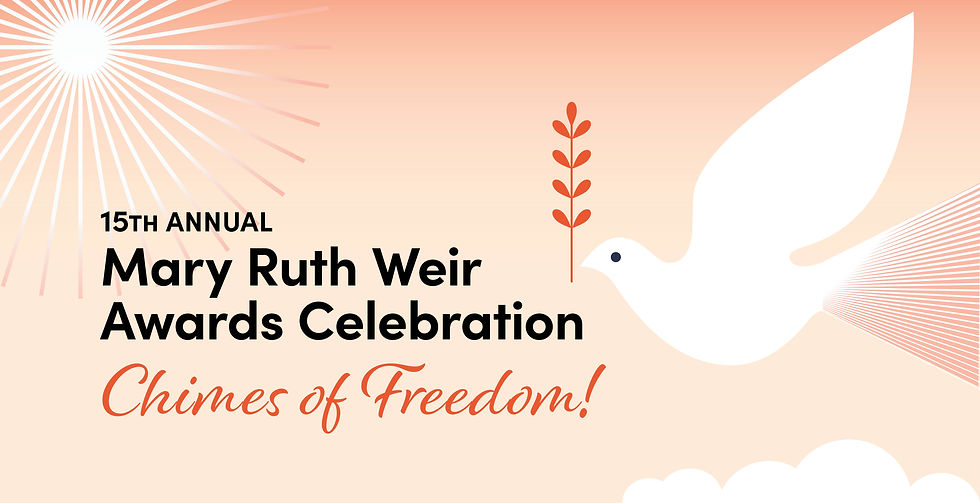
ABOUT the AWARD
The annual Ruth Mary Weir Award recognizes social justice champions who have devoted their lives to standing up to oppression in the nonviolent pursuit of a society that does not practice capital punishment.
2024 AWARDEES

Mary Ruth Weir Human Rights Award
Kim Jackson serves as senator for Georgia State Senate District 41, representing portions of DeKalb and Gwinnett counties. Kim works every day to build a safer, fairer and more prosperous Georgia, and to bring the diverse voices of her district—immigrants, refugees and people living on the margins—to the Capitol.
During her first few terms in office, Kim defended voting rights against relentless attacks; authored life-saving legislation for survivors of stalking, domestic violence and human trafficking; secured unprecedented funds for Black farmers, local pre-K programs and those recovering from traumatic brain injuries; served as co-chair of the Mental Health Caucus; and earned appointment to the Georgia Commission on Family Violence.
An Episcopal priest from the rural South, Kim made Georgia home more than a decade ago. After graduating from Furman University, she volunteered as an EMT and led her colleagues at Emory’s Candler School of Theology to advocate for criminal justice reform in Georgia. Upon receiving her Master of Divinity, Kim began her vocation as an Episcopal priest. Over the past 10 years of ministry, she has served as a college chaplain, a nationally renowned consultant and preacher, and a parish priest. As the vicar of the Church of the Common Ground, Kim co-creates church with people who are experiencing homelessness in downtown Atlanta.
Kim and her family live in Stone Mountain, GA. She and her wife are stewards of a small "hobby farm" where they raise goats, ducks, honeybees, rabbits and chickens.

Martina Correia Courage Awards
Carole Butcher joined LifeLines UK in 1992 after seeing a BBC documentary in the late 1980s that followed the last 14 days in the life of Edward Earl Johnson, who was executed in the gas chamber at Mississippi’s Parchman Prison. She shares:
“The documentary is called 14 Days in May and I was truly shocked by what I saw. In 1992, another BBC documentary aired that followed the friendship between a woman and a young man whose family had abandoned him. He was put to death after a short friendship of just a few months—it was heartbreaking. The woman was a member of the newly formed writing group LifeLines, and more than 6,000 people, including myself, applied to join after watching the film."
“My first two pen friends were incarcerated in Oklahoma—William, with whom I corresponded for 8 years, and Norman, for 4. Both were executed by lethal injection. It was a truly traumatic time in my life."
“In 2000, I was asked to become the coordinator for Georgia, and I readily agreed. I supported both prisoners and writers for 5 years before serving as LifeLines’ membership secretary from 2005 to 2010. I resumed the coordinator role in 2016 after losing my Georgia pen friend, Brandon, to execution that February. It was probably the worst of all, as I had been writing to Brandon for more than 15 years."
“I’m now writing to my current pen friend, Alfonso, in Georgia, who is serving life. I’ve looked after the interests of the prisoners and writers in Georgia for a total of 13 years. Every aspect of my time—as a member, coordinator, membership secretary, trustee, and committee member—has been an honor. It has changed my life for the better. Over the years, I’ve met incredible people in both the U.S. and the U.K.—speakers at our conferences, exonerated prisoners, lawyers, chaplains, supporters and dedicated workers.”

Martina Correia Courage Awards
Rachel Gross and her husband, Bob, founded the Death Row Support Project in 1978 with support from the Church of the Brethren. In what became a lifelong vocation, Rachel matched more than 10,000 people with individuals on death row—establishing more than 15,000 relationships. This would not have been possible without the help of family, friends and others in the abolition community. Needless to say, the writers themselves—those on death row and those writing to them—are the soul of the project.
For the past 40 years, Rachel and Bob have lived near North Manchester, Ind, where they share seven acres with two other families, 60 chickens, three cats, two beehives and one dog.